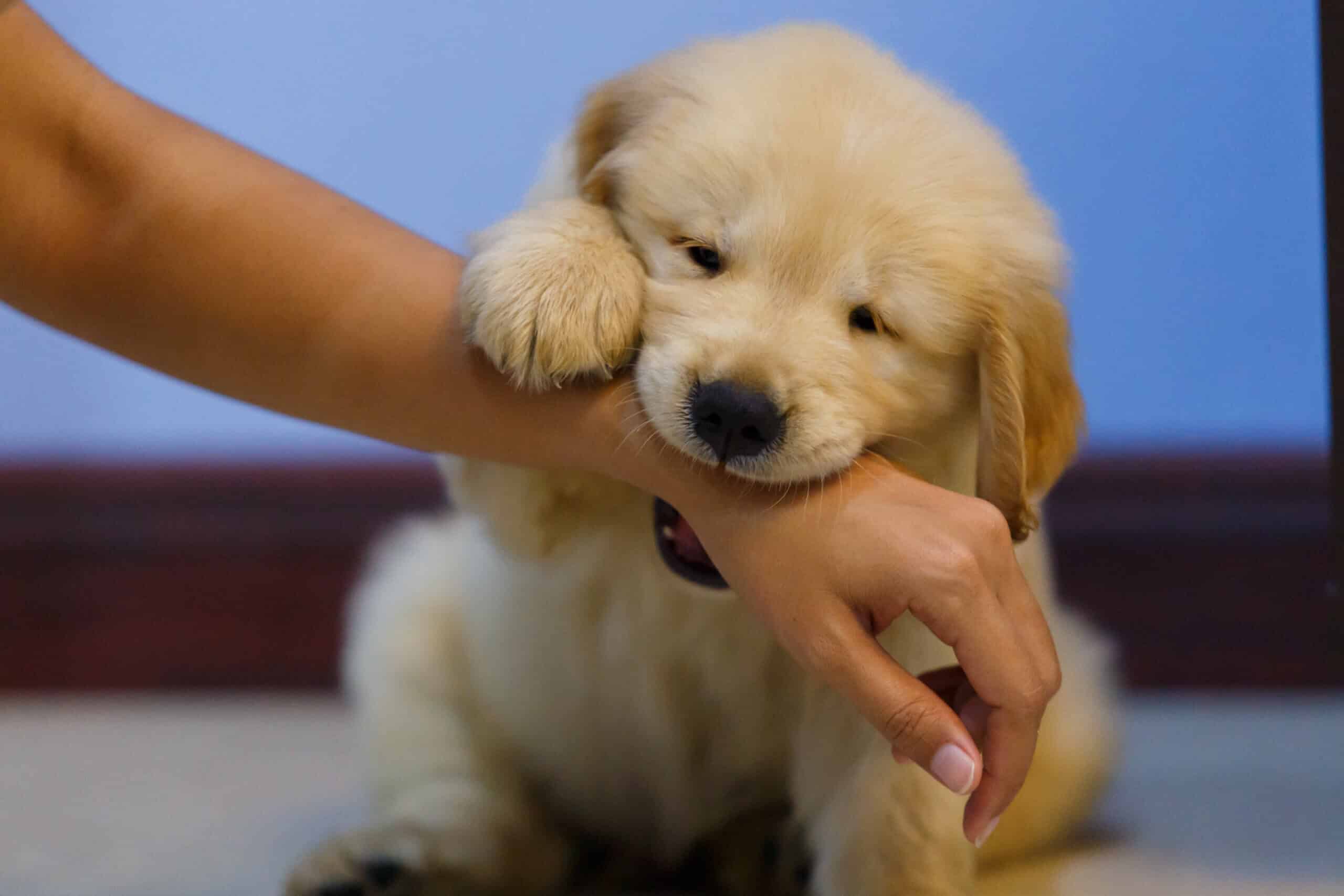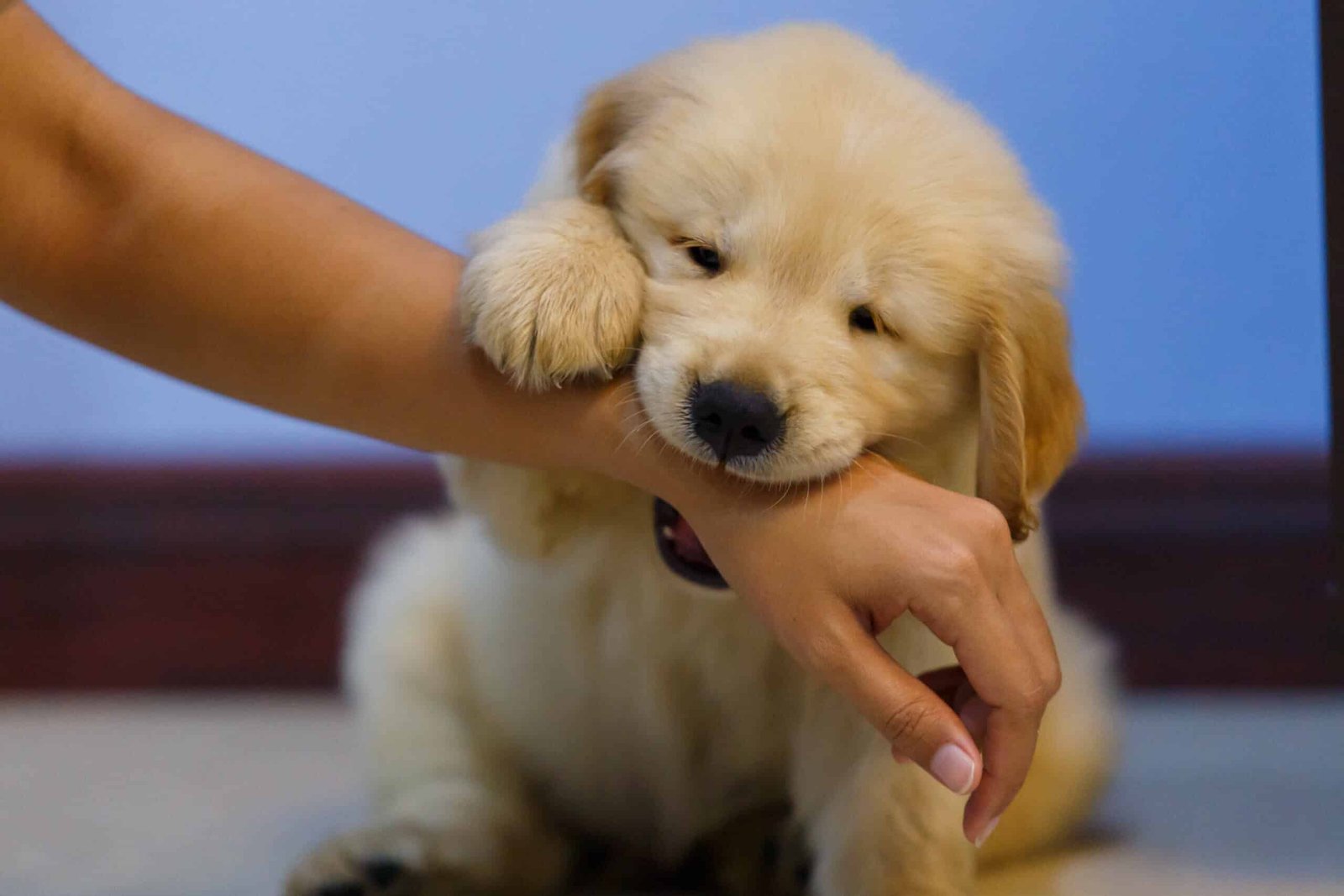If you’re wondering when your adorable golden retriever puppy’s biting frenzy will end, you’ve come to the right place! Golden retriever puppies are known for their playful and energetic nature, but those sharp little teeth can be quite a handful. So, when does golden retriever puppy biting stop? Let’s find out!
Now, you might be thinking, “How long do I have to endure these little nips and nibbles?” Well, the biting phase is a normal part of a golden retriever puppy’s development. Typically, it starts around 8 weeks of age and can continue for a few months. So, hang in there, because it won’t last forever!
As your golden retriever puppy grows, you’ll notice their biting behavior gradually diminishes. By the time they reach 4 to 6 months of age, their biting should significantly decrease. But don’t worry, with consistent training and positive reinforcement, you can help speed up this process and teach your puppy the appropriate ways to play and interact with you.

When Does Golden Retriever Puppy Biting Stop?
Golden Retrievers are one of the most popular dog breeds, known for their friendly and gentle nature. However, like all puppies, Golden Retriever puppies can exhibit a biting behavior during their early months. If you’re a new Golden Retriever owner, you may be wondering when this biting behavior will stop and how to manage it. In this article, we’ll explore the stages of puppy biting, tips for handling it, and when you can expect it to subside.
The Stages of Puppy Biting
Golden Retriever puppies, like most other dog breeds, go through various stages of development. One of these stages is teething, which usually occurs around three to six months of age. During this period, puppies experience discomfort and an urge to chew to relieve their teething pain. They may begin to nip and bite during playtime as a way to explore their surroundings and interact with others.
It’s important to note that puppy biting is normal and not a sign of aggression. However, it is essential to address this behavior early on to prevent it from becoming a more serious issue as your puppy grows. Let’s explore some tips for managing and eventually curbing their biting behavior.
Socialization and Training
Socialization plays a crucial role in shaping a puppy’s behavior. Expose your Golden Retriever puppy to various environments, people, and other animals from an early age. This exposure will help them develop better bite inhibition and learn appropriate behavior during play. Additionally, enroll them in puppy training classes to teach them commands like “sit,” “stay,” and “leave it.” Consistent and positive reinforcement will help them understand what is expected of them and redirect their biting impulses.
Furthermore, teach your puppy the “soft mouth” command, which reinforces gentle play and discourages biting too hard. You can do this by offering treats or toys and rewarding them for calm and controlled play. Be patient and consistent in your training efforts, as it can take some time for your puppy to fully grasp the concept.
Biting Subsides with Age and Training
As your Golden Retriever puppy grows and reaches adolescence, typically around six to nine months of age, their biting behavior should start to decrease. This is because their adult teeth have fully developed, and their teething phase is over. Additionally, the training and socialization efforts you put in during their early months will start to pay off, and they will learn appropriate play behavior.
It’s important to note that individual puppies may progress through these stages at different rates. Some puppies may have a longer teething phase or may require more training and reinforcement to curb their biting behavior. Patience, consistency, and positive reinforcement are key to helping your Golden Retriever puppy transition out of the biting stage and develop good manners.
Tips for Managing Golden Retriever Puppy Biting
Now that we’ve discussed the stages of puppy biting and when you can expect it to stop, let’s explore some practical tips for managing this behavior:
1. Provide Appropriate Chew Toys
During the teething phase, it’s essential to provide your Golden Retriever puppy with appropriate chew toys. This will satisfy their urge to chew and help relieve any discomfort. Opt for durable toys made specifically for teething puppies to ensure they are safe and long-lasting.
2. Use Timeouts
If your puppy becomes too bitey during play or doesn’t respond to a soft mouth command, calmly and gently remove yourself from their reach. This will teach them that biting leads to the end of playtime, and they will start to associate biting with losing your attention.
3. Avoid Rough Play
Avoid engaging in rough play with your puppy, as this can encourage more biting and aggressive behavior. Stick to gentle play and redirection to appropriate toys. If your puppy does bite too hard, let out a Yelp or “ouch” to indicate pain, which mimics how other puppies communicate during play. This will help teach them bite inhibition.
4. Redirect with Positive Reinforcement
When your puppy starts biting your hands or feet, redirect their attention to a chew toy or interactive puzzle toy. Reward them when they engage with the toy instead of biting you. This will help reinforce appropriate chewing behavior and redirect their biting impulses.
5. Stay Consistent and Patient
Remember that curbing puppy biting takes time and consistent effort. Be patient with your puppy and continue with the training methods mentioned. Consistency and positive reinforcement are key to guiding your Golden Retriever puppy through the teething and biting stages.
When Does Golden Retriever Puppy Biting Stop Completely?
While individual puppies may vary, you can generally expect the biting behavior of Golden Retriever puppies to diminish by the time they reach nine to twelve months of age. By this stage, their adult teeth should be fully developed, and they should have a better grasp of appropriate play behavior. However, it’s essential to continue reinforcing good behavior and providing appropriate outlets for chewing to prevent regression.
Conclusion
Golden Retriever puppy biting is a normal behavior that can be managed through appropriate training and socialization. It usually subsides as puppies grow and their adult teeth come in. By following the tips mentioned, providing appropriate chew toys, and staying consistent with training, you can guide your Golden Retriever puppy through the biting stage and help them develop good manners. Remember to be patient, as each puppy progresses at their own pace.
Key Takeaways: When Does Golden Retriever Puppy Biting Stop?
- Golden Retriever puppies usually stop biting around the age of 6 to 8 months.
- Puppy biting is a natural behavior, but it can be managed through proper training and socialization.
- Consistent and positive reinforcement methods can help discourage biting and promote good behavior.
- Providing appropriate chew toys and redirecting their attention can also help reduce biting tendencies.
- Patient and consistent training from the owner is essential for achieving desirable results.
Frequently Asked Questions
Golden Retrievers are known for their playful nature, and puppy biting is a common behavior during their early months. It’s important to understand when this behavior typically stops so that you can guide your puppy accordingly. Here are some commonly asked questions related to when Golden Retriever puppy biting stops:
1. How long does the biting phase typically last with Golden Retriever puppies?
The duration of the biting phase can vary from puppy to puppy, but it generally starts around 8-12 weeks of age and can last up to 6 months. During this time, your puppy’s teeth are growing, and biting is a natural instinct. It’s crucial to teach them appropriate biting behavior so they learn not to bite too hard and to control their impulses.
Positive reinforcement training techniques, such as redirecting their attention to chew toys, discouraging rough play, and rewarding good behavior, can help shorten the duration of the biting phase and teach them appropriate boundaries.
2. How can I stop my Golden Retriever puppy from biting too hard?
Golden Retriever puppies have a strong urge to chew and mouth on things, including your hands. To stop them from biting too hard, it’s important to establish clear boundaries and train them using positive reinforcement methods. Here’s what you can do:
Firstly, never encourage rough play. If your puppy bites too hard, let out a small yelp or say “ouch” to mimic the reaction of a littermate. Then, immediately redirect their attention to a chew toy or a suitable alternative. This helps teach them that biting too hard ends the playtime.
Consistency is key. Be patient, persistent, and provide them with lots of appropriate toys to chew on. With time and consistent training, your Golden Retriever puppy will learn to control their biting and understand what is acceptable behavior.
3. When should I be concerned if my Golden Retriever puppy’s biting doesn’t improve?
While biting is a normal behavior for Golden Retriever puppies, there are instances where you should be concerned if the biting doesn’t seem to improve or escalates. If your puppy continues to bite aggressively, causing injury or drawing blood, it may be necessary to seek professional help. Here are some signs to be aware of:
If your puppy becomes overly possessive of toys or food, shows intense aggression during play, or displays unpredictable behavior, it’s important to consult a professional dog trainer or behaviorist. They can assess the situation and provide guidance to address any underlying issues, ensuring a safe and happy environment for both you and your puppy.
4. How can I redirect my Golden Retriever puppy’s biting behavior onto appropriate chew toys?
Redirecting your Golden Retriever puppy’s biting behavior onto appropriate chew toys is a helpful technique to teach them appropriate boundaries. Here’s how you can do it:
Whenever your puppy starts to mouth or bite your hands or furniture, gently remove your hand and replace it with a chew toy. Ensure the toy is interesting, textured, and appropriate for chewing. Encourage them to play with the toy by praising and rewarding them when they chew on it instead of biting you. Consistency and persistence are key in reinforcing this behavior and teaching them that chew toys are the appropriate outlet for their biting instinct.
5. Are there any safe alternatives to redirect my Golden Retriever puppy’s biting behavior?
Absolutely! In addition to providing chew toys, you can also use other safe alternatives to redirect your Golden Retriever puppy’s biting behavior. Some options include:
Freezing a washcloth or a dog-friendly teething toy can provide relief for their teething discomfort while deterring them from biting inappropriate objects. Additionally, interactive puzzle toys and treat-dispensing toys can keep them mentally stimulated and distract them from biting.
Remember, patience, consistency, and positive reinforcement are crucial in guiding your Golden Retriever puppy through this phase and teaching them proper behavior.

Do This Every Day To Stop Golden Retriever Puppy Biting
Summary:
So, when will that pesky biting from your golden retriever puppy stop? Well, it usually starts to get better around four to six months of age as they learn proper behavior. However, it’s important to be patient and consistent with training to help them understand what’s acceptable. Remember, those sharp puppy teeth will eventually be replaced with adult teeth that are less bitey. In the meantime, provide plenty of chew toys and redirect their biting to appropriate objects. Just hang in there, and soon you’ll have a well-behaved golden retriever who knows not to use their teeth as weapons!
In conclusion, golden retriever puppies usually stop their biting behavior around four to six months of age. With proper training and patience, you can teach them what’s appropriate to chew on and redirect their biting to appropriate toys or objects. Soon enough, those puppy teeth will be replaced by less bitey adult teeth, and you’ll have a wonderfully behaved furry family member. Keep up the good work!
